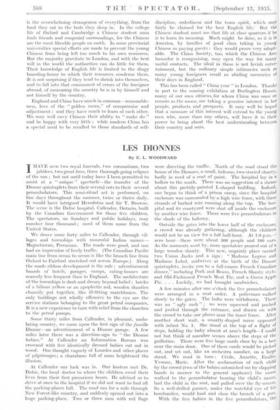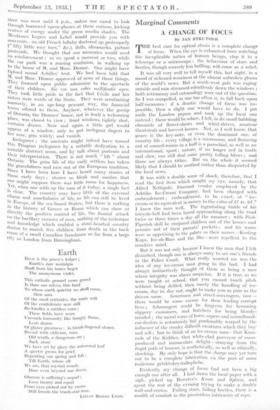LES DIONNES
By E. L. WOODWARD
IHAVE seen two royal funerals, two coronations, two jubilees, two great fires, three thorough-going eclipses -of the sun ; but not until today have I been permitted to assist at a " unique " spectacle—the transfer of the .Dionne quintuplets from their several cots to their several perambulators. This semi-ritual act is performed, on fine days throughout the summer, twice or thrice daily.
• It would have intrigued Herodotus and Sir T. Browne. The scene is the Dafoc hospital, Callender, Ontario, built by the Canadian Government for those five children. The spectators, on Sundays and public holidays, may number four thousand ; most of them come from the United States.
We drove some forty miles to Callender, through vil- lages and townships with mournful Indian names- Magnetawan, Powassan. The roads were good, and one had an impression of lively traffic. (The Canadian Pacific main line from ocean to ocean is like the branch line from Oxford to Fairford stretched out across Europe.) Along the roads ribbon development is the rule ; advertisement boards of hotels, • garages, camps, eating-houses are scarcely less frequent than in England. The architecture 'of the townships is drab and dreary beyond belief ; bricks of a bilious yellow or an apoplectic red, wooden shanties clumsily put together, like ill-fitting matchboxes. The only buildings not wholly offensive to the eye are the service stations belonging to the great petrol companies. It is a new experience to turn with relief from the churches to the petrol pumps.
Some thirty miles from Callender, in pleasant, undu- lating country, we came upon the first sign of the famille Dionne—an advertisement of a Dionne garage. A few miles later there was a direction-sign to " the Dionne babies." At Callender an Information Bureau was crowned with five identically dressed babies cut out in evood. One thought vaguely of Lourdes and other places of pilgrimages; a charabanc full of nuns heightened the illusion.
At Callender our luck was in. Our hostess met Dr. Defoe, the local doctor to whom the children owed their lives from their first precarious hours. He advised us to drive at once to the hospital if we did not want to find all the parking-places full. The road ran for a mile through New Forest-like country, and suddenly opened out into a huge parking-place. Two or three men with red flags were directing the traffic. North of the road stood the house of the Dionnes, a small, hideous, two-storied shanty, 'badly in need of a coat of paint. The hospital lay in a hollow to the south. There was no suggestion of a shrine about this prettily-painted L-shaped building; Indeed, one began to think of a prison camp, since the hospital enclosure was surrounded by a high wire fence, with three strands of barbed wire running along the top. The hos- pital and its courtyard were shut off inside the enclosure by another wire fence. There were five perambulators in the shade of the balcony. • Outside the gates into the lower half of the enclosure, a crowd was already gathering, although the children would not be on view for •a full half-hour. At 1.0 pan.-- zero hour—there were about 500 people and 100 ears. As the moments went by, more spectators poured out of a large wooden shanty. This new, ungainly place carried two Union Jacks and a sign : " Madame Legros and Madame Lebel, midwives at the birth of the Dionne quintuplets, invite you to a full-course French Canadian dinner," including Pork and Beans, French Shanty style, and Old-Fashioned French Meat Pie, and a Green Apple Pie. . . . Luckily, we had brought sandwiches.
A few minutes after one o'clock the five perambulators were arranged in a neat order. A policeman walked slowly to the gates. The bolts were withdrawn. There was an " ugly rush " ; we were squeezed and pushed and jostled through the entrance, and drawn on with the crowd to take our plates near the inner fence. After another short wait, a smartly-draped 'nurse appeared with infant No. 1. She stood at the top of a flight of steps, holding the baby almost at arm's length—I could not but think of macabre scenes above the steps of the guillotine. There were five large cards close by in a boS near the main door. One of these cards would be picked out, and set out, like an orchestra number, on a large stand. We read in turn Cecile, Annette, EmiliO, Yvonne, Marie. After the acclamation of each child -by the crowd (two of the babies astonished me by clapping hands in answer to the general applause) the nurse walked to the perambulator bearing the child's name, laid the child in the seat, and pulled over the fly-screen, So a well-drilled gunner, under the watchful 'eye of his bombardier, would' load and close the breach of a gull' With the five babies in the five perambulators, the show was over until 3 p.m., unless one eared to look through borrowed opera-glasses at these curious, kicking centres of energy under the green muslin shades. The Mesdames Legros and Lebel would. provide you with Souvenirs—an old French lullaby doctored up _grotesquely („ fifty little rosy toes,” &e.), dolls, almanacks, picture Postcards. We thought that our memories would need 110 reinforcement ; so we spent a moment or two, while the car park was a roaring confusion, in walking up to the house of 1W. and Mme. Dionne. One might have tiptoed round Achilles' tent. We had been told that M. and Mme. Dionne approved of none of those things. They frowned upon public admission to the spectacle of their children. Sic vos non vobis mellificatis apes. They took little pride in the' fact that Cecile and her sisters were wards of the State. They were scrutinising narrowly, in an age-long peasant way, the financial terms offered to them. Anyhow, whatever the gossip of Ontario, the Dionnes' house, not in itself a welcoming Place, was closed to view ; front windows tightly shut, curtains drawn. Now and again a little girl would appear at a window, only to put inelegant fingers to her nose, grin widely, and vanish. Inelegance ; the ancients might indeed have turned this Priapian inelegance by a suitable dedication to a suitable abstract noun, and by talk about portents and their interpretation. There is not much " lift." about Ontario. The grim life of the early settlers has taken the gracefulness and ease out of the European tradition. Since I. have been here I have heard many stories of those early days ; stories so bleak and sombre that one might suppose there was little room for happiness. Yet, when one adds up the• sum of it today, a single fact is clear. The country 'may have little of the external .11.arm and nonchalance of life, as life can still be lived 111 Europe, of the sea-board States; but there is nothing in the history of Greece or Rome which can show so directly the positive control of life, the frontal attack on the bacillary enemies of man, nothing of the technique and knowledge which enabled a stout,hearted . country • doctor to snatch five children from death in the back room of a small Canadian farmhouse as far from a large City as London from Birmingham.







































 Previous page
Previous page